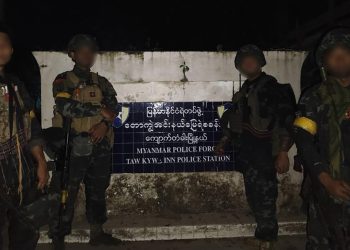NAYPYITAW — Women’s advocacy groups urged delegates attending the third session of the 21st Century Panglong Peace Conference this week to push for a gender equality policy regarding women’s representations across all sectors.
As many key federal principles related to equality for ethnic minorities, autonomy and the Constitution have been kept out of discussion during this round of talks, the Union Peace Dialogue Joint Committee decided that gender equality issues would help keep the process going forward.
During interviews with dozens of delegates at the peace conference that commenced on Wednesday, some people expressed their disappointment, as gender equality is the only issue under the political sector discussions, while others acknowledged that it is essential.
Some male politicians expressed that gender equality is not a key issue. But others who are involved in the ongoing peace negotiations and legislature acknowledged its importance.
“We hope a gender equality policy is agreed upon and approved after this session,” said Padoh Saw Kwe Htoo Win, adding but it won’t be completed at once and will need further discussion. Padoh Saw Kwe Htoo Win is the vice chairman of the Karen National Union, a signatory to the Nationwide Ceasefire Agreement. He has been involved in peace negotiations since they began in 2011.
“I think a gender equality policy could be incorporated into the Constitution,” said Naw Pan Thinzar Myo, the Karen ethnic affairs minister of Yangon Region. She told The Irrawaddy that women can contribute in many sectors including development and peace negotiations but that a supportive environment is needed for that to occur.
“When women are allowed the space to contribute, they can do more,” she said. “The more women who participate, the closer we will be to attaining peace.”
Gender equality is a discussion that is a long time coming, some say.
“It is late now to be discussing this issue in our country,” said Hket Htain Nan, a former lawmaker who is participating in the conference as a political parties delegate. He is the chairman of the Unity and Democracy Party of Kachin State.
In a joint statement released on Tuesday, the Alliance for Gender Inclusion in the Peace Process (AGIPP) and Women’s League of Burma (WLB) said a gender equality policy must be in place in the future democratic federal Union.
It stated that delegates of all sectors: political, economic, social, land, and environment and security, need to include in discussions at least a 30 percent quota system; that the election system must guarantee gender equality in the Constitution; and that effective policies must be in place to protect women and children who face gender-based violence in conflict zones.
It also urged for policies that guarantee accountability and discourage gender discrimination.
“There are many people who think that gender equality is not important, but it is incredibly important, as there is extreme inequality in reality,” said Htang Kai Naung of the Kachin State Women’s Network, which is a member of AGIPP.
“Women have been discriminated against either because of tradition or religious beliefs,” she added. “Only when women are allowed to participate in the current peace process, in which the principles for a future Constitution are being set, will the legislation provide better protection and support for them.”
Members of society need to accept this and more men should help raise the issue, added Htang Kai Naung.

















